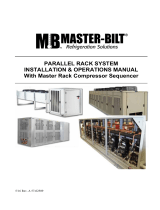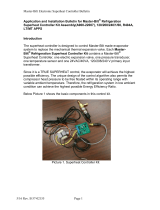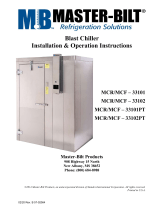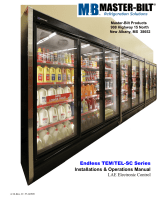Page is loading ...

1
PS SERIES
PARALLEL RACK SYSTEM
GLYCOL CHILLER
START UP GUIDE
11/03/2015 Rev 00

2
Contents
INTRODUCTION ............................................................................................................................... 3
WARNING LABELS AND SAFETY INSTRUCTIONS .................................................................. 4
PARALLEL RACK NOMENCLATURE ........................................................................................... 5
GENERAL RACK DESCRIPTION .................................................................................................... 6
TYPICAL DX REFRIGERATION COMPONENTS ......................................................................... 6
TYPICAL CONTROL/ POWER COMPONENTS ............................................................................ 6
TYPICAL PUMP STATION COMPONENTS .................................................................................. 7
CONTROL THEORY ......................................................................................................................... 7
PRE-START UP .................................................................................................................................. 7
START UP ........................................................................................................................................... 7
CPC E2E Controller............................................................................................................................. 9
STARTUP TROUBLESHOOTING .................................................................................................. 10
REFERENCE DOCUMENTS ........................................................... Error! Bookmark not defined.

3
INTRODUCTION
Thank you for purchasing Master-Bilt refrigeration equipment. This manual contains important instructions for
startup, and troubleshooting. Read this entire manual carefully before starting or servicing your Master-Bilt
equipment.
NOTICE
Installation and service of the refrigeration and electrical components must be performed by a refrigeration
mechanic or licensed electrician.
DANGER
Equipment MUST be properly grounded.
Improper or faulty hook-up of electrical components of the refrigeration units can result in severe injury or
death. All electrical wiring hook-ups must be done in accordance with all applicable local, regional or
national standards.
NOTICE
Read this manual before installing your refrigeration equipment. Keep the manual and refer to it before
doing any service. Failure to do so could result in personal injury or equipment damage.
The portions of this manual covering refrigeration and electrical components contain technical instructions intended
only for persons qualified to perform refrigeration and electrical work.
This manual cannot cover every installation, use, or service situation. If you need additional information, call or write
us:
Parts and Technical Service Department
Master-Bilt Products
908 Highway 15 North
New Albany, MS 38652
Phone (800) 684-8988
Email: service@master-bilt.com

4
WARNING LABELS AND SAFETY INSTRUCTIONS
This is the safety-alert symbol. When you see this symbol, be alert to the potential for personal
injury or damage to your equipment.
Be sure you understand all safety messages and always follow recommended precautions and safe operating
practices.
NOTICE TO EMPLOYERS
You must make sure that everyone who installs, uses, or services your refrigeration equipment is
thoroughly familiar with all safety information and procedures.
Important safety information is presented in this section and throughout the manual. The following signal words are
used in the warnings and safety messages:
DANGER: Severe injury or death WILL occur if you ignore the message.
WARNING: Severe injury or death CAN occur if you ignore the message.
CAUTION: Minor injury or damage to your refrigeration can occur if you ignore the message.
NOTICE: This is important installation, operation or service information. If you ignore the message, you may
damage your refrigeration.
The warning and safety labels shown throughout this manual are placed on your Master-Bilt Products
refrigeration at the factory. Follow all warning label instructions. If any warning or safety labels become
lost or damaged, call your customer service department at (800) 684-8988 for replacements.
This Label is located on the condensing unit

5
PARALLEL RACK NOMENCLATURE
PS E A C 5 2 Z C
-
XXXXX
Quote Number
Voltage
A = 115/60/1
B = 208-230/60/1
C = 208-230/60/3
D = 460/60/1
E = 460/60/3
F = 200-220/50/3
G = 380-420/50/3
H = 208/60/1
J = 380/50/1
K = 200-220/50/1 or 220/50/1
L = 575/3/60
M = 200-230/60/3
R =265/60/1
T = 380/60/3
Refrigerant
Z = R404A
# Suction Groups
1 to 3
# Compressors
2 to 10
Condenser Location
R = Remote
I = Integrated
C = Mounted on Common
Frame
Condensing Method
A = Air Cooled
W = Water Cooled
Frame
I = Interior
E = Exterior
Rack
PS = Standard Rack
GPS = Glycol Rack

6
GENERAL RACK DESCRIPTION
Master-Bilt GPS series parallel rack systems operate with up to ten compressors in parallel design. A typical
rack system has a single suction group and a common discharge and liquid circuit. The suction group is for
medium temperature equipment with an average temperature of +23°F SST. This suction group transfers
heat from a glycol pumping loop through a brazed plate heat exchanger. The glycol pump station has a
primary and backup pump to supply refrigerated glycol solution to glycol unit coolers and other equipment.
TYPICAL DX REFRIGERATION COMPONENTS
• 2-10 Scroll compressors
• Individual Compressor Dual Pressure Controls
• Individual Compressor Oil Level Controls
• Oil Pressure Differential Valve
• Oil Line Sight Glass
• Oil Filter
• Oil Separator
• Air Cooled or Water Cooled Condenser
• Head Pressure and Hot Gas Bypass Valves
• Liquid Receiver with Dual Pressure Relief Valves
• Replaceable Core Liquid Filter/ Drier
• Liquid Sight Glass
• Replaceable Core Suction Filter
• Suction Accumulator
TYPICAL CONTROL/ POWER COMPONENTS
• 220V Control Circuit
• Main Disconnect Switch and Circuit Breaker
• Power Distribution Blocks
• GFCI Service Receptacle (115V)
• CPC E2E RX Rack Controller
• 1 or more CPC Relay Boards
• Digital Compressor Controller
• Individual Compressor Circuit Breakers
• Individual Compressor Contactors
• Condenser Fan Contactors
• Phase Monitor
• 230V to 24V Transformers for CPC and Oil Controls Power
• Receiver Liquid Level Probe
• Suction, Discharge, and Drop Leg Pressure Transducers
• Suction, Discharge, Drop Leg, and Ambient Temperature Probes
• Variable Frequency Drive for Pump Motor
• Motor Starter for Backup Pump Motor
• Superheat Valve Controller for Electronic Expansion Valve

7
TYPICAL PUMP STATION COMPONENTS
• Brazed Plate Heat Exchanger
• Analog Pressure Gauges
• Pressure Relief Valve
• Pressure Transducers
• Low Pump Suction Safety Switch
• Glycol Fill Tank
• Air Separator and Vent
• Expansion Tank
• Primary and Backup Glycol Pump
• Constant Bypass Valve
CONTROL THEORY
The CPC E2E controller receives pressure and temperature inputs from all devices and controls outputs to
maintain set points. SST for a suction group is maintained by reading the pressure input from the suction
group and switching or unloading compressors to maintain a programmed pressure set point. Inputs from
discharge and drop leg pressure transducers are used to turn on and off fan banks on the condenser. The
CPC E2E controller opens and closes the liquid refrigerant solenoid based on returning glycol temperature.
Set points for glycol temperature are changeable in the E2E controller.
PRE-START UP
• Glycol chiller systems are pre-charged from the factory with R404A:
• System is shipped with initial filter/drier cores installed.
• Oil is pre-charged from the factory. Ensure adequate oil charge before starting the compressors. Use
manufacturer recommended oil type. Add until oil is shown in the upper glass on the oil reservoir.
• Never allow liquid refrigerant to reach the compressors. Damage to the compressors may occur.
START UP
1. Verify all breakers and switches are in the off position.
2. Verify all loads are in refrigeration mode.
3. Turn on condenser power switch and breaker.
4. Turn on all compressor toggle switches.
5. Turn on main power switch and breaker.
6. Turn on control power breaker (2 pole 240V). All compressor contactors should engage while E2E
control is booting up. If a contactor did not engage, adjust dual pressure switch and ensure switch is
closed.
7. Check the phase monitor to verify that the green light is illuminated. If red, measure input power and
adjust voltage on phase monitor. If still red adjust phasing on main power.
8. Add glycol to pump station at fill tank.
9. Turn on VFD pump breaker and verify proper rotation.
10. Continue to add glycol to system and remove air from system until all air is purged and 25-35 psi pump
discharge pressure is achieved.
11. Turn on backup pump breaker.
12. Review the E2E rack controller.
a) Hold Alt and press N. Verify that all relay boards are online.
b) Press menu, 7, 1. Verify that all transducers and temperature probes are reading expected values.
c) Verify that phase monitor input is an expected value.

8
d) Press Home key to return to main screen.
13. Turn on breaker for compressor 1 and ensure proper rotation of compressor.
14. Turn on breakers for all other compressors.
15. Monitor suction pressure and discharge pressure for expected operation. Suction pressure decreases
with compressor operation and Discharge pressure increases.
16. Compressors will cycle on and off at random while the system is in learning mode. The E2E is building
a control algorithm for the compressor control. This is normal and could last up to several hours.
17. Add refrigerant to the high side of the system as required until the receiver has 20% during the coldest
weather for the region. Use high side charging method only.
18. Verify the suction header pressure and discharge header pressure with an accurate refrigeration gauge
set. Calibrate the E2E as necessary.
19. Set the head pressure valve (typically A8 valve) to achieve 200 psi head pressure.
20. Verify Glycol Circuit Temperature set point in E2E controller. Typical glycol temperature is 25F.
21. If returning glycol temperature has stabilized and is too warm, gradually lower suction set point until
desired returning glycol temperature is achieved. Typical returning glycol is 25F.
22. Set rack EPR to rack suction set point pressure. This setting will prevent glycol temperature from
dropping if rack suction pressure drops.
23. Once all coolers are approximately at operating temperature. Set and check flow valves on each case
and cooler.
24. Check oil reservoir after two (2) days of operation and add oil as necessary.
25. After all adjustments have been made, check all valves for proper stem position and replace valve caps.
26. Change filter/ drier cores after start up (approximately 3 days).

9
CPC E2 Quick Reference Card can be
found at the end of this manual or in
the References Section.
CPC E2E Controller
E2 Shortcuts:
All shortcuts below start at home screen (press home key anytime to return home)
Log In/ Out: Press Log In/Out key. Username: USER, Password: PASS
Function Key command values are shown on the LCD screen just above the function key.
Press Help Key at any time to access instructional information.
• Check I/O board status: Menu, 7, 7, 1
• Verify Inputs: Menu, 7, 1
• Verify Outputs: Menu, 7, 2
• Change rack suction pressure set point: Menu, 1, (use arrow to select group), Enter, F5, F2, F2
• Change circuit temperature set point: Menu, 3, (use arrow to select circuit), Enter, F5, F2
• Backup program to USB: Insert USB drive inside cover, Menu, 7, 3, 5, 6, 2, F1
• View alarms: Press Alarm Key
• Clear Alarm: Alarm Key,(select alarm to be cleared), F3, A (for single), B (for all)
• Reset Alarm: Alarm Key,(select alarm to be cleared), F2, A (for single), B (for all)
Notice: Never acknowledge alarms. Always reset or clear.
Help Key: Press for more information on items.
Alarm Key
Home Key
Menu Key
Back Key
Navigation Arrows

10
STARTUP TROUBLESHOOTING
Compressor contactors don’t engage when E2E calls for compressors:
• Check dual pressure switch on compressor.
o Initial setting is 25 cut-in, 20 differential, 375 high cut out.
o Adjust cut-in and differential to operate outside of E2E set points.
• Check voltage at each device along control circuit. See wiring diagram.
Head pressure is too low/ high:
• Adjust A8 head pressure valve until 200 psi is reached.
Evaporator pressure/ temperature too high:
• Fully open EPR valve at evaporators.
• Adjust suction set point downward in small increments until evaporator pressure is reached.
o See E2 shortcuts above.
Rack failure on phase loss:
• If phase monitor LED is red, adjust voltage range to match input voltage.
• If phase monitor LED is red, verify input phases are aligned to rack.
• If phase monitor LED is green, verify input logic is correct in program.
o Log into controller with USER, PASS
o Press: Menu, 7, 1
o Highlight the input to verify/ change
o Press: Enter, Enter
o Screen should be as shown
o To reverse logic change Active Out to ON, Inactive Out to OFF
I/O board relays are working with reverse logic.
Hold Ctrl Press N
to turn on Names
Hold Alt Press F
to turn on FULL
Icon on when
Logged in

11
• Verify wiring is NO or NC depending on device. Compressors are NC, Solenoids are NC, Defrost
Heaters are NO.
• Verify failsafe dip switches are correct. NC relays are UP. NO relays are DOWN.
State of Normally Closed (NC) Contacts on
MultiFlex Relay Points
Fail
Safe
Switch
Light
is ON
Light
is OFF
Comm
Loss
Power
Loss
Up (ON) Closed Open Closed Closed
Down
(OFF)
Open Closed Closed Closed
I/O boards not online:
• Verify board addressing
State of Normally Open (NO) Contacts on
MultiFlex Relay Points
Fail
Safe
Switch
Light
is ON
Light
is OFF
Comm
Loss
Power
Loss
Up (ON) Open Closed Open Open
Down
(OFF)
Closed Open Open Open
Dip #
1
2
3
4
5
Value On
1
2
4
8
16
Value Off
0
0
0
0
0
S3 is Input Address 1-5
S4 is Relay Address 1-5
Add values from ON dip switches.
Example: dip 1 and 3 are on. Value of
dip 1=1 value of dip 2=0 value of dip 3=4.
1+0+4= 5. Network address is 5.
Relay Number
(Fail Safe Switch)

12
E2E locks out compressor on oil failure.
• Verify oil level in oil separator/ reservoir. Oil should be visible in top and bottom sight glass.
• Verify oil level at oil management control (OMB) at compressor. Level in sight glass should be at
least half.
• Check LED on OMB control. Green LED= Level OK, Yellow LED=Solenoid open adding oil, Red=
Fill time exceeded.
• If oil level is OK, reset or clear alarm in E2E controller.
REFERENCE DOCUMENTS
CPC E2E Operation and Installation Manual, Document 026-1614:
http://www.emersonclimate.com/en-us/Resources/Technical_Documentation/Documents/MNL-0261614-Rev5-E2-IO-Manual.pdf
CPC E2E Quick Reference Card 026-1699:
http://www.emersonclimate.com/Documents/Retail%20Solutions/0261699.pdf
CPC MultiFlex I/O Board Installation and Operation Manual, Document 026-1704:
http://www.emersonclimate.com/en-us/Resources/Technical_Documentation/Documents/MNL-0261704-Rev7-MultiFlex-IO-Board-
Operation-Manual.pdf
Parker Compact Wide-Range Pressure Regulators, Bulletin 25-94 G
http://www.parker.com/parker/jsp/documentdisplay.jsp?mgmtid=427d42a204b83110VgnVCM10000048021dacRCRD
Evaporator Pressure Regulating Valves, Bulletin 90-20, Form SD-73:
http://www.parker.com/parker/jsp/documentdisplay.jsp?mgmtid=deec166a991b9210VgnVCM10000048021dacRCRD
http://www.parker.com/parker/jsp/documentdisplay.jsp?mgmtid=a21d166a991b9210VgnVCM10000048021dacRCRD
Oil Level Control System, Bulletin 110-10:
http://www.parker.com/parker/jsp/documentdisplay.jsp?mgmtid=abcf166a991b9210VgnVCM10000048021dacRCRD
/











